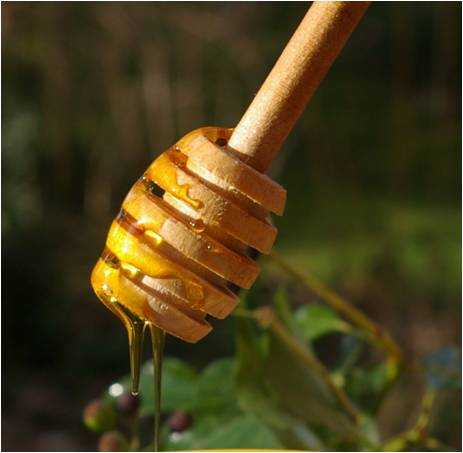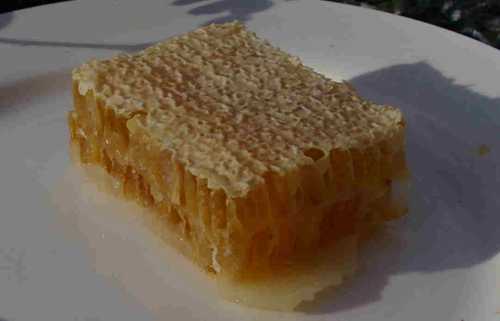Honey Vs Sugar:
A Comparison
Honey vs sugar: which is the best? Is honey better than sugar, are there any health benefits of eating honey, and if so, should we try
and substitute honey for sugar?
Here is a comparison of honey and sugar based on nutritional values and calorie content expressed as a ‘Percentage of the Ideal Daily Value’ (% DV) and based on a typical daily calorie intake of 2000. I think this is the best way to put honey in perspective, so that we can really see where honey holds its value in our diet.
In particular, in our comparison of honey vs sugar we'll take a look at:
- calorie and carbohydrate comparison of honey vs sugar, including carbohydrate type
- Vitamin Content
- Protein and Amino Acids Content
- Mineral Content
I have compiled the results into separate nutritional tables (below). Only when armed with the facts can we really consider whether honey is healthier than sugar!
In order to add further perspective, I added in a further food (although not in table form): actually an apple!
Why an apple? Well why not? Especially where minerals are concerned, I thought it would be a good idea to compare honey with an additional every-day, healthy food.

Honey vs Sugar - is nutrition the whole story?
I would argue that nutrition is not the whole story with honey and its health benefits. For one thing, honey contains specific anti-bacterial properties and has been found to assist in controlling MRSA in hospitals.
The anti-bacterial qualities may be a reason why some people try honey for acne whilst the humectant (moisture preserving or retaining) properties could lead people to experiment with homemade beauty treatments, such as honey in facial masks.
But for the purpose of this page and comparison, we are looking at the nutrient values only.
Different honeys may have slightly different nutritional and anti-bacterial properties
Ordinary granulated sugar may hardly differ from one brand to the next, but honey can vary due to the differing properties of the flora from which the bees gather the honey. For example, the properties of Manuka honey may be different from those of say, honey from bees that were foraging on garden flowers, orchards, oil seed rape, wildflowers, clover and so on.
 A portion of honeycomb.
A portion of honeycomb.Not only are there some variations depending on where the bees have been foraging, but also, depending on how the honey has been processed. Raw honey may be different from soft set honey.
During my research, I have used several data sources, and those sources of information were obviously based on different batches of honey.
Nutritional Comparison of Honey and Granulated Sugar
Calorie and Carbohydrate Comparison
From the tables, you can see that 100g of granulated white sugar contains more
calories versus 100g of honey. Remember that honey consists of about 17%
water (water having no calories), whereas granulated white table sugar contains no
water.
Per 100g, honey has 304 calories, whereas granulated sugar provides 387 calories per 100g.
Honey vs sugar: tables comparing calories
| Honey: Calories (Per 100g) | ||
|---|---|---|
| %DV | ||
| Calories | 304 (1237 kJ) | 15% |
| From Carbohydrates | 303 (1273 kJ) | |
| From Fat | Nil | |
| From Protein | 1.0 (4.2 kJ) | |
| Granulated Sugar: Calories (Per 100g) | ||
|---|---|---|
| %DV | ||
| Calories | 387 (1620 kJ) | 19% |
| From Carbohydrates | 387 (1620 kJ) | |
| From Fat | Nil | |
| From Protein | Nil | |
Granulated sugar is 100% carbohydrate derived from sugars.
Honey carbohydrate is also comprised almost entirely of sugars, but with 1 calorie provided by protein. However, the types of sugars inside honey are entirely different from those found in granulated table sugar.
Granulated sugar consists of 100% sucrose.
Honey consists of only about 1.5g of sucrose, and the rest comprises other forms of sugar, especially fructose and glucose. This is particularly relevant if you are an athlete or are engaging in sport, due to the provision of both short and sustained energy provision. This is because glucose is absorbed quickly by the body, giving the body an immediate boost of energy.
Meanwhile, the Fructose is absorbed more slowly, providing energy over a longer period.
Therefore, because honey contains high levels of both glucose and fructose, it may provide both an immediate and sustained energy boost to those engaging in sports, in relatively small quantities.
Honey vs sugar: tables comparing carbohydrate
| Honey: Carbohydrate (Per 100g) | ||
|---|---|---|
| %DV | ||
| Total Carbohydrate | 82g | 27% |
| Dietry Fibre | 0.2g | 1% |
| Starch | Nil | |
| Sugars | 82.1g | |
| Sucrose | 0.89g | |
| Glucose | 35.744g | |
| Fructose | 40.934g | |
| Maltose | 1.44g | |
| Galactose | 3.10g | |
| Granulated Sugar: Carbohydrates (Per 100g) | ||
|---|---|---|
| %DV | ||
| Total Carbohydrate | 100g | 33% |
| Dietry Fibre | 0.0g | |
| Starch | Nil | |
| Sugars | 99.9g | |
If you are dieting and wish to substitute honey for sugar as part of a calorie controlled diet, then honey may help to sustain your energy levels, and in theory, you won't need quite as much, because honey is sweeter – but I do not advise you to eat a lot of it!
When you look at how many calories are in honey, the advantage over sugar is a modest one where dieters are concerned!
At the end of the day, honey still contains a lot of calories. Just because this website is about bees, I don't think it is a good thing to try and sell to readers ideas about honey and nutrition that could be misleading!
Vitamin Content Comparison of Honey vs White Sugar
Honey certainly contains some vitamins, whereas white granulated sugar contains no vitamins at all.
Honey provides 1% of your recommended Vitamin C, Niacin (Vitamin B3), Folate (a water-soluble B vitamin) and Pantothenic Acid (Vitamin B5) requirement.
Honey vs sugar: comparing vitamins
| Honey: Vitamins (Per 100g) | ||
|---|---|---|
| %DV | ||
| Vitamin C | 0.5mg | 1% |
| Niacin | 0.1mg | 1% |
| Folate | 2.0mcg | 0% |
| Pantothenic Acid | 0.1mg | 1% |
| Choline | 2.2mg | |
| Betaine | 1.7mg | |
There are no vitamins in granulated sugar
However, it has to be said that the vitamin content in honey is not
massive.
For example, as stated, the table shows that if you eat 100g of honey,
you’ll only get 1% of your daily recommended amount of vitamin C – and
you’ll get a lot of calories (over 300!).
On the other hand, I happened to look at the vitamin C content of an apple. If you eat 100g of raw, fresh, unpeeled apple, you’ll
get 8% of your daily requirement of vitamin C, and you’ll consume only
52 calories!
Of course, apples have other vitamins too, but if high
energy is a priority, or if you are needing to put on weight, then honey is better for you.
Honey Vs Sugar For Protein and Amino Acids Content
Honey contains quality protein, albeit a very tiny amount, and 100g of honey gives you a score of 19.
The closer the score to 100, the better. In this respect, honey is
significantly better than sugar.
But what about that raw apple? Believe it or not, 100g of the humble
apple gets a score of 31!
Sugar on the other hand, gets a miserable zero!
Honey vs sugar: tables comparing protein and amino acids
| Honey: Protein & Amino Acids (Per 100g) | ||
|---|---|---|
| %DV | ||
| Protein | 0.3g | 1% |
| Amino Acid Score | 19 | |
| Granulated Sugar: Protein & Amino Acids (Per 100g) | ||
|---|---|---|
| %DV | ||
| Protein | 0.0g | 0% |
| Amino Acid Score | 0 | |
Honey Vs Sugar: Mineral Content Comparison
Sugar has very little mineral content.
100g of Honey is better, offering 1% of your daily calcium, potassium, zinc and selenium intake, 2% of your recommended daily iron value, and 4% for manganese. However, again these are small percentages of the daily recommended amount, and a lot of calories.
So yes, honey is healthier than white sugar in terms of minerals, but you will still need to find other sources of these minerals in additional
foods.
Honey vs sugar: tables comparing minerals
| Honey: Minerals (Per 100g) | ||
|---|---|---|
| %DV | ||
| Calcium | 6.0mg | 1% |
| Iron | 0.4mg | 2% |
| Magnesium | 2.0mg | 0% |
| Phosphorus | 4.0mg | 0% |
| Potassium | 52.0mg | 1% |
| Sodium | 4.0mg | 0% |
| Zinc | 0.2mg | 1% |
| Manganese | 0.1mg | 4% |
| Selenium | 0.8mcg | 1% |
| Flouride | 7.0mcg | |
| Granulated Sugar: Minerals (Per 100g) | ||
|---|---|---|
| %DV | ||
| Calcium | 1.0mg | 0% |
| Potassium | 2.0mg | 0% |
| Selenium | 0.6mcg | 1% |
| Flouride | 1.0mcg | |
What’s the Conclusion? Is Honey Better For You Than Sugar?
It seems that honey is more nutritious than white granulated sugar. However, if it's vitamins & minerals you're after, then you may be better off looking to fruits and vegetables, because honey is very
high in calories, and in order to get your daily requirement you'd have to eat a lot of it (and no doubt put on weight).
As an aside, I heartily recommend consulting nutritional guides for a fuller perspective of foods generally. Balanced diet is key in my view!
Should I Substitute Honey for Sugar?
It's a personal choice. Nutritionally, I don't feel the benefits of eating honey over sugar are very significant given that most people consume honey in small amounts. Although sugar is made from plants and therefore starts off as a natural product, it is then refined and processed. However, there are organic, fairly traded versions available.
However, most commonly, I think people replace sugar with honey in small quantities, not because of diet but because of taste!
If you found this page helpful or interesting, I'd really be grateful if you would share it with others - if not this page, perhaps another, such as Gardening For Bees.
Thank you so much :) .
